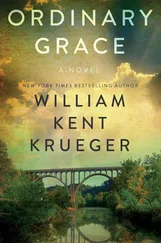“A fee?…”
“Yes, that’s the fee for a day’s outing.”
Adam had given his name and made an appointment for the following Saturday.
So Adam and Rita hired a car and Rita drove them to Eltham on the following Saturday, mid-morning. Adam had told Rita that he just wanted to see the boy again, see how he was getting on, make sure he was happy and being looked after properly. Rita said she was perfectly prepared to be their chauffeur, thought it was an excellent idea and looked forward to meeting Ly-on. They stopped on the way at a supermarket and bought food and drink — sandwiches, pies, scotch eggs, water, colas, juices — and a travelling rug and paper cups and plates, some plastic knives and forks. On a whim, passing a toy shop two doors down, Rita had suggested they buy some beach games — a Frisbee, a diabolo, some flat paddles with a ball to hit.
The Church of John’s orphanage at Eltham — Adam noticed that the claim ‘John Christ’ was more and more frequently absent in the light of the church’s new prosperity — was a detached Victorian brick villa in a large garden with a car park where the front lawn had once been. Rita said she would wait in the car and Adam went into the building for his appointment with Mr Bednarczyk.
Inside, it was like stepping into an old school, Adam thought. A smell of cooking, of rubberised floor coverings, dusty radiators and chipped paintwork. A struggling prep school that had seen better days and whose pupil numbers were remorselessly dwindling, was the image that came to mind. Through a rear window Adam could see half a dozen little boys in jeans and matching emerald-green fleece jackets kicking a football about on a piebald rectangle of grass fringed by a tall cypress hedge. He could hear a piano being played badly in an upstairs room: chords struck heavily, wrong notes amongst them. A young, hot-faced woman in a nylon overall clattered down the stairs with a mop and a bucket.
“I’m looking for Mr Bednarczyk,” Adam said.
“Down the corridor, first left.”
Adam followed her directions to find a door with a plastic nameplate: ‘K. Bednarczyk’. He knocked and a voice invited him to enter.
Kazimierz Bednarczyk was sitting at a desk covered in papers and files and behind him could be glimpsed a partial view of the orphanage’s front car park through the dangling, dusty, oatmeal louvres of a vertical blind. Adam could see their hired car and Rita walking around, taking the air, exercising, windmilling her arms. Badnarczyk’s peroxide-blond hair and neat blond beard failed to disguise the man Adam knew as Gavin Thrale. They looked at each other for a few seconds. Thrale remained utterly impassive.
“Mr Belem,” he said offering his hand. “Do take a seat.”
They shook hands and Adam sat down.
“What are your plans for the day?”
“I thought we might go down to the coast, find a beach, have a picnic.”
“Sounds delightful. Ly-on would need to be back by six o’clock.”
“Not a problem — I understand.”
“Just fill this in and sign — there.” Thrale pushed a release form across the desk towards him. “I think we can waive the fee — seeing as it’s you.”
“Thank you,” Adam said.
As Adam filled in the form Thrale picked up the phone, punched out a number and asked, “Is Ly-on ready? Good. We’ll meet him in the hall.”
They sat there looking at each other.
“How are you?” Adam said.
“I’m surprisingly well, considering. And you?”
“I’m fine.”
“The church has been very good to me,” Thrale said, cautiously. “I believe you had the same opportunity offered.”
“Yes. But it just wasn’t the right time.”
“Bishop Yemi is a most accommodating man.”
“One might say a remarkable man.”
“You’ve heard he’s standing for parliament. Rotherhithe East. As a Conservative.”
“He is a remarkable man,” Adam said.
“My friends call me Kazio,” Thrale said.
“I’m Primo.”
“What about meeting up one day, Primo? Have a drink. Talk things over.”
“I’m not so sure that would be a good idea, Kazio.”
“Yes…You’re probably right. Funny old life, eh?” Thrale said, standing up.
They walked down the corridor to the hall where Ly-on was waiting, wearing the same jeans and emerald-green fleece uniform of the other boys.
“John!” he shouted when he saw Adam, and ran towards him. Adam fell to his knees and they hugged.
“I know you come for Ly-on,” he said, smiling broadly. “Green, green peas, man.”
Adam stood up, a little overwhelmed, as Ly-on went to fetch his bag.
“You knew his mother, I believe.”
“Yes. She used to serve the food sometimes, at the church. You probably remember her,” Adam said.
“It’s all a bit of a blur, those times, I have to confess,” Thrale said, as Ly-on came back. “Enjoy your day, Mr Belem.”
“Thank you, Mr Bednarczyk.”
And so Adam, Rita and Ly-on had driven east towards Rochester and Chatham until Adam saw a sign for the Hoo Peninsula and he said, “Let’s go to Hoo. Sounds interesting.”
“Hoo,” Ly-on repeated. “Hoo, hoo, hoo.”
They followed the signs until they saw one that said ‘Allhallows-on-Sea’ and ‘Beach’, driving through the village until they came to a dead end by the caravan site. They skirted the holiday park with its rows of static caravans and its covered swimming pool and leisure centre, and parked the car where the metalled road turned into a track. Then they discovered that the various games they had bought — the Frisbee, the fat-paddled tennis bats and ball, the diabolo (or Chinese yo-yo) were missing. Rita remembered putting the bags down in the shop but thought that Adam had picked them up and stowed them in the boot. Perhaps they were still in the shop, Adam ventured — they could call back on the way home, it didn’t matter — they could improvise. So, carrying the plastic bags that contained their picnic, they walked along the coastal path heading for Egypt Bay.
They found a spot on the edge of the bay, spread their rug and ate their sandwiches and pies and drank their fizzy drinks. Adam felt he was in a kind of time warp — the flat marshlands behind him, the refulgent estuary in front, and beyond the hazy mass of the Essex shore, Canvey Island, the Maplin Sands, Foulness. Ly-on took his jeans off and changed into his swimming trunks behind a towel held out by Adam. He went paddling in the shallows, shouting out, “Remember you promised to teach me to swim, John!”
Adam looked up and down the river’s coastline. There was an empty tanker temporarily moored offshore, riding high in the water, and it reminded Adam that this was where, after the Napoleonic Wars, all the prison hulks were berthed, old, rotting, mastless three-deckers full of convicts destined for Australia…Australia — where his father and sister and nephews were living. Don’t think about it. So Adam wondered what it must have been like for the convicts in the hulks, looking out at this, their last sight of England, the flat Kent shore and the dark Cooling Marshes, their minds full of desperate thoughts of escape—
“He seems all right,” Rita said, gesturing at Ly-on. “Doesn’t talk about his mum.”
“Yeah,” Adam said. “I hope so.”
Rita put on her sunglasses and lay back to enjoy the weak but warming sunshine. Adam felt in a turmoil of emotions as he sat watching Ly-on, his arms hugging his knees, and, triggered by the thoughts of escaping convicts and prison hulks, found himself wondering if Turpin’s body had made it this far downstream.
He had thought very little about Turpin since their last encounter, and suffered no guilty conscience. Sometimes he wondered if there was something wrong with him that would explain this unfeelingness he experienced about what he had done, as if his new life and everything that had happened to him over the last few months had changed him in some crucial way, hardened him. Perhaps it had — perhaps he was a different person, to some significant extent, from the man he had been. But there was nothing to grieve about as far as Turpin was concerned — he couldn’t imagine Turpin’s wives and children missing him, speculating amongst themselves as to why Vince had disappeared from their lives all of a sudden. Anyway — all he had done was tip him into the river, after all. He just hoped, somehow, that Turpin’s was one of those bodies that the river took with it, along with the rest of its rubbish, and that Turpin’s corpse had made it through the dangling southern loop of the Isle of Dogs, with its reverse currents and collecting pools, and that the ebb tide that night had carried him past Greenwich and Woolwich and Thamesmead and Gravesend, spewing him out eventually into the fathomless cold waters of the North Sea. He would bob up at some stage, bloated and decomposed, be washed up on a shingle bank somewhere, on Foulness Island or the Medway estuary, or perhaps even more further afield, on the beaches of Northern France, Belgium or Holland — but nobody would make much of a fuss about the drowning of Vincent Turpin.
Читать дальше












